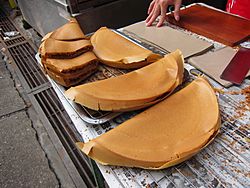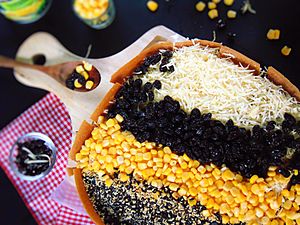Apam balik facts for kids

A giant apam balik variation
|
|
| Alternative names | Ban Jian Kuih (Tâi-lô: bàn-tsian-kué), Chin Loong Pau, Min Chiang Kueh, Martabak Manis, Peanut Pancake, Terang Bulan, Martabak Bangka, Kue Bandung, Apam Pulau Pinang, Kuih Haji, Kueh Singapura, Kuih Malaya |
|---|---|
| Type | Pancakes |
| Place of origin | Fujian, China |
| Region or state | East and Southeast Asia |
| Associated national cuisine | China, Brunei, Indonesia, Malaysia, Singapore |
| Created by | Zuo Zongtang |
| Main ingredients | Flour, hot water, baking powder, bicarbonate soda, sugar, eggs, peanut, margarine, butter |
Apam balik is a yummy sweet pancake. It's also known by names like Martabak Manis (meaning "sweet martabak") or terang bulan (meaning "moonlight"). You might also hear it called a peanut pancake. This tasty dessert started in China. Now, you can find many different kinds of Apam balik at street stalls and restaurants across Brunei, Indonesia, Malaysia, and Singapore. It's also popular in Hong Kong and Taiwan.
The name Mànjiān sounds like Mǎnqīng, which refers to the Manchu people who ruled China during the Qing dynasty. The word guǒ means pancake.
Contents
How Apam Balik Began
Apam balik is believed to have been created by Zuo Zongtang. He was a military leader in China during the late Qing dynasty. In 1855, an army called the Taiping Heavenly Kingdom attacked the Fujian region. General Zuo was sent to stop them.
He needed to feed his soldiers without bothering the local people. So, he changed their usual flatbread meal. Instead, he made a pancake using local ingredients. He filled it with ground cane sugar and peanuts, which were easy to find.
This pancake recipe spread across the Fujian region, especially near Quanzhou. Later, it traveled throughout Southeast China. Hokkien and Teochew immigrants brought it to Southeast Asia, also known as Nanyang. Merchants then helped spread it to other nearby countries.
Other Names for This Sweet Treat
This delicious pancake has many different names. The name often depends on where you are.
In Indonesia
- Terang Bulan means "bright moon." This name is used in places like Central Java and East Java. It refers to the large, round pancake before it's folded, which looks like a full moon.
- Martabak Manis means "sweet martabak." This name is common in Sumatra, Jakarta, and West Java.
- Kue Bandung is used in Semarang, Central Java.
- Martabak Bangka is found in Northern Sumatra.
- Apam Pinang is used in West Kalimantan.
- Hok Lo Pan is heard in the Bangka Belitung Islands.
In Malaysia and Singapore
- Ban Jian Kueh is a common Hokkien name in both countries.
- Dai Gau Min is a Cantonese name used in Perak.
- Chin Loong Pau is another Cantonese name, used in Kuala Lumpur.
- Kap Piang is a Hakka name from Sabah.
- Mak Pan is a general Hakka name.
- Apam Pulau Pinang is a Malay name used in Penang.
- Kuih Haji and Apam Balik are Malay names used in certain areas.
- Apong is used in Kelantan.
- Apang Balek is found in Terengganu.
- Apom Balek is used in Kedah.
- Terang Bulan is also used in Sabah.
- Min Chiang Kueh is a Teochew name used in Singapore.
- Peanut Pancake is a common English name in Singapore.
In Brunei
- Kuih Malaya or Kuih Singapura are Malay names used in Brunei. These names came about during the time when many Chinese people moved to places like Singapore.
In China
- 滿煎糕 is the name used in China.
In Hong Kong
- 冷糕 and 砂糖夾餅 are Cantonese names used in Hong Kong.
In Taiwan
- 麥仔煎 is the name used in Taiwan.
What Apam Balik is Like
The batter for Apam balik is made from flour, eggs, sugar, baking soda, coconut milk, and water. This batter is cooked on a thick, round iron pan. Plenty of palm margarine is used to stop it from sticking.
Then, different fillings are sprinkled on top. The most common and traditional fillings are crushed peanuts with sugar and sweetcorn kernels. But today, you can also find modern toppings like chocolate sprinkles and cheddar cheese! After the toppings are added, the pancake is folded in half. This is why it's called a "turnover pancake." Finally, it's cut into several pieces to serve.
In Indonesia, there's a smaller version called martabak mini or terang bulan mini. These are made with smaller pans.
The texture of Apam balik can be different. It depends on how much batter is used and the type of pan. Some are crispy, like a crumpet. Others are very thin and light, breaking easily when you bite them. The thin ones are usually called apam balik nipis.
There's also a special apom balik from the Peranakan culture. It's quite similar to the Indonesian Serabi pancake.
See also
 In Spanish: Apam balik para niños
In Spanish: Apam balik para niños
 | Chris Smalls |
 | Fred Hampton |
 | Ralph Abernathy |







